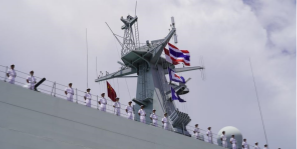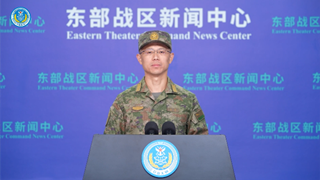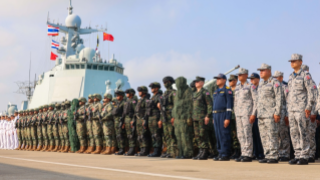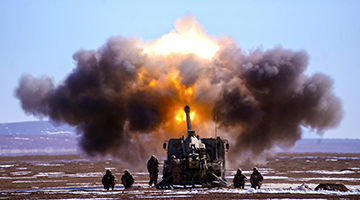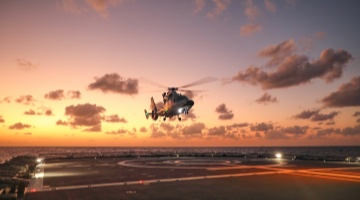By Liu Leina and Ge Dong
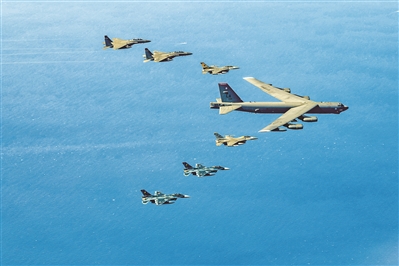
The ROK Air Force fighter jets participate in the first joint air exercise with the US and Japan on October 22.
Since mid-October, by taking advantage of its host country role in some international airshows, defense forums and joint military exercises, the ROK has launched a wave of defense diplomacy activities, in a bid to enhance its regional presence through strengthening civil-military cooperation, hyping up security issues and extending its alliance framework. The Yoon Suk-yeol government's recent defense diplomacy combo is a product of the superposition of economic pursuits and domestic conservative thoughts. Although it could alleviate the pressure of domestic public discontent in the short term, in the long run, the administration's Cold War mentality of forming blocs is not conducive to regional peace and stability.
Home-field diplomacy stage
The 14th Seoul International Aerospace and Defense Exhibition (Seoul ADEX), which lasted for six days, kicked off this round of ROK defense diplomacy. According to ROK media, the Seoul ADEX paves the way for the country to become the world's fourth-largest arms exporter. In the meantime, the Seoul Defense Dialogue (SDD), an annual international defense forum hosted by ROK's Ministry of National Defense, was also held. Instead of focusing on the current security situation and regional destabilizing factors, the attending parties vigorously hyped up topics at the forum, such as the military application of space, network and artificial intelligence technologies.
Meanwhile, the ROK also directed a number of "flexing muscle" shows to echo with the above "verbal plays". In the wake of the USS Ronald Reagan aircraft carrier sailing into the Busan Port, the air forces of the US, Japan and the ROK held their first joint air exercise around the Korean Peninsula. The largest ever defense exercise in the ROK's history, codenamed "2023 Homeland Defense Exercise", was also conducted with the participation of the US alliance troops for the first time. In addition, the ROK Ministry of National Defense also disclosed the details around the evacuation of their nationals in the Middle East, saying that the Cheonghae Unit on the overseas deployment missions in the Indian Ocean had carried out defense exchanges with the fleets of regional countries and its allies.
According to reports, the ROK's defense diplomacy activities will continue until November to demonstrate the country's achievements in national defense construction and create buzz for its policy in defense diplomacy. At the end of October, the ROK Defense Acquisition Program Administration (DAPA) signed a supply security agreement with the relevant agencies of the Pentagon, intending to manifest their solid alliance and ensure the industrial chain stability of the bilateral military systems. The two sides will also negotiate the conclusion of a reciprocal defense procurement agreement to achieve mutual openness of military markets. In November, the ROK will also hold the 55th US-ROK Security Consultative Meeting and the defense ministers' meeting with the United Nations Command member states to discuss issues such as extended deterrence and wartime command.
Hyping up to build momentum
The ROK Minister of National Defense Shin Won-sik said that their recent series of defense moves, the big centerpiece of ROK's military industry promotion activities of the year, have got great attention from the military and political leadership of the country and have won continuous media coverage and sensationalization.
During the Seoul ADEX, the ROK media clamored for the news including the potential participation of UAE in ROK's KF-21 fighter jet program, Poland and other Eastern European countries' preference for the country's military products, and the deployment of weapon markets in South America. They loudly proclaimed that the global influence of the military industry would empower its diplomacy, while deliberately downplaying negative messages such as the loss of major customers like Indonesia and other Southeast Asian countries.
As for some topics in the SDD including promoting the military application of artificial intelligence, ROK official media said that it is an important decision to ramp up the scientific and technological development of the ROK military, and connect it with the US military's recent acceleration of the weaponization process of artificial intelligence, adding that integration with the US military and alliance will ensure the ROK military embarks on the right path of development. However, some foreign media believe that such speculations by the ROK expose its Cold War mentality of forming blocs, and its militaristic inclination under conservative concepts and stance of idolizing the US, which will exacerbate regional arms tensions.
Relevant countries also acted in concert with the ROK by strengthening interactions with it. The strategic bombers send by the US military completed a flyover for the first time. The US also rooted for the country by showcasing the F-22 fighter jets, which have been absent for seven years, at the air shows and debuting the EA-18G electronic warfare aircraft at the Seoul ADEX. Senior officials from NATO and the EU publicly acclaimed the ROK's military construction achievements and its contributions to the security of the region and Eastern Europe. Australia called the ROK a reliable defense partner and planned to send F-35A, P-8A, and other types of aircraft to participate in the exercises and training in the country.
The ROK's interaction with its allies and partners has extended the influence of defense diplomacy and tied itself to the US chariot. Its tangible desire in taking sides and acting as a lackey directly pushed up the regional bloc tendency, and echoed the so-called "Indo-Pacific version of NATO" schemed by the US-led Western countries. It is worth mentioning that although the joint air exercise expanded the defense cooperation space among the three parties (US, Japan and ROK), the excessive intimacy between the ROK and Japan has triggered discontent among the opposition party and a large group of people in ROK. It can be said that the ROK government has sought a breakthrough in defense diplomacy in the sacrifice of domestic public opinion.
In addition, Seoul has continuously advertised the reciprocal Defense procurement agreement, the security of supply agreement, and the annual meeting with Washington, which are regarded as another milestone in defense cooperation between the two countries. However, some ROK military experts hold a skeptical outlook on bilateral cooperation because such an unequal master-servant relationship and the central position of Japan in the US alliance put the ROK in a marginalized and awkward position.
Unspoken subtext behind the successive plays
In addition to building a platform to strengthen momentum, the recent successive defense diplomacy activities of the Yoon Suk-yeol government also conceal domestic political calculations and diplomatic strategic subtext.
On the one hand, Yoon Suk-yeol, who came to power as a freshman politician, has been running on a bumpy road after taking office and constantly haunted by a low popularity rating due to accusations such as dishonesty, confidant scandals and weak reform. Toward the end of 2023, his emphasis on promoting defense diplomacy is targeted at earning points for himself by playing the economic card of the military industry, the political card of the hardcore relationship with the US alliance, and the military card of safeguarding security. After all, the defense transformation and military-industrial economics stand out as the few notable projects during his administration, while relying on the US and wooing Japan are also self-proclaimed diplomatic achievements they take pride in.
On the other hand, as foreign media have said, the ROK's recent defense diplomacy has been revolving around the US. Every single move of ROK, may it be exploring the military industry markets, developing multilateral military cooperation, or facilitating military application of artificial intelligence and other plans, is nothing but following footprints of the US. This also reveals the Yoon Suk-yeol government's attempt to elevate its international status and join the so-called Club of Great Powers by leveraging the political, diplomatic and defense influences of the US and even the West.



